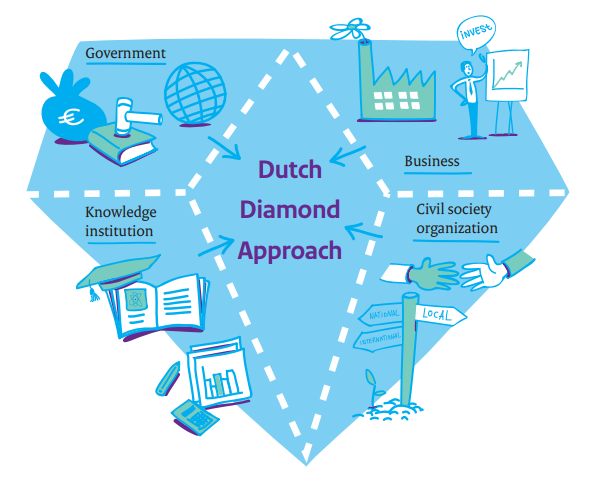Building the Dutch Climate Agreement: a public-private partnership for a sustainable future
Polderen
“Polderen” is the name for a typical Dutch way of tackling large challenges in society. It does not translate easily, but some refer to it as the consensus model. All parties with a stake in a matter are invited at the table, to come together and discuss and strive to reach consensus in order to solve the problem at hand. From national pension plans to a local playground: the Dutch organise themselves to have their say. And such is also the case in how they tackle the challenge we face to reduce our CO2 emissions as agreed in the Paris Agreement. In this consensus model the principle is that nobody wins, but everybody gains a little.
In the intended Dutch Climate Agreement government, the private sector associations, NGO’s and knowledge institutions are invited to discuss what measures we will all have to take in order to obtain the set goals. The FNLI, the Dutch association of food and drink producers and one of the consortium members of INDUCE, has a seat at the table and is currently discussing with all these different stakeholders on what measures are most effective.
Ambition
The intended agreement is expected to be slightly more ambitious then the Paris Agreement: ‘the National Climate Agreement, the Dutch contribution to “Paris”, has one central goal, which is to reduce greenhouse gas emissions in the Netherlands by at least 49 percent in 2030 compared to 1990. Additionally, the Dutch government’s efforts in a European context could result in an even more ambitious target towards 55 percent.

Negotiating Tables
The ambitions are set, the aim is high. With such an enormous challenge one negotiating table will not do. Five tables have been set up, each with their own scope: electricity, industry, mobility, built environment and lastly agriculture and land usage. For AgriFood businesses both the agriculture and industry tables are important. Food processing companies often comprehend aspects of both agriculture and processing in the foodchain. The Climate Agreement is not set in stone yet, but we can enlighten you on a few small topics to show in what direction the road is leading us and perhaps inspire you along the way.
- A reduction of 50% of consumer food waste in 2030.
- A shift towards more sustainable protein production
- Adaptation in rules and regulations in order to make better use of what is now waste as valuable raw materials
And 89 other pages full of ideas and possible measures. Fortunately this draft agreements it is available in English for you to read here. The final agreement is expected to be reached in the first months of 2019. If so, an English translation will become available on www.klimaatakkoord.nl.
The role of INDUCE in the Climate challenge
As the consensus model shows everybody has to contribute. This includes the AgriFood businesses in The Netherlands. The FNLI represents the Dutch food processors, in total about 550 businesses, which represent 90% of the turnover of the food processing industry in The Netherlands. Although Dutch food industry has realised large energy reduction in the past years, energy reduction is still an important step companies can take in striving to reduce CO2 emission. Therefore, the training toolbox of INDUCE is much welcomed in the Netherlands and will hopefully lead to important reductions in the processing operations of food and drinks.





